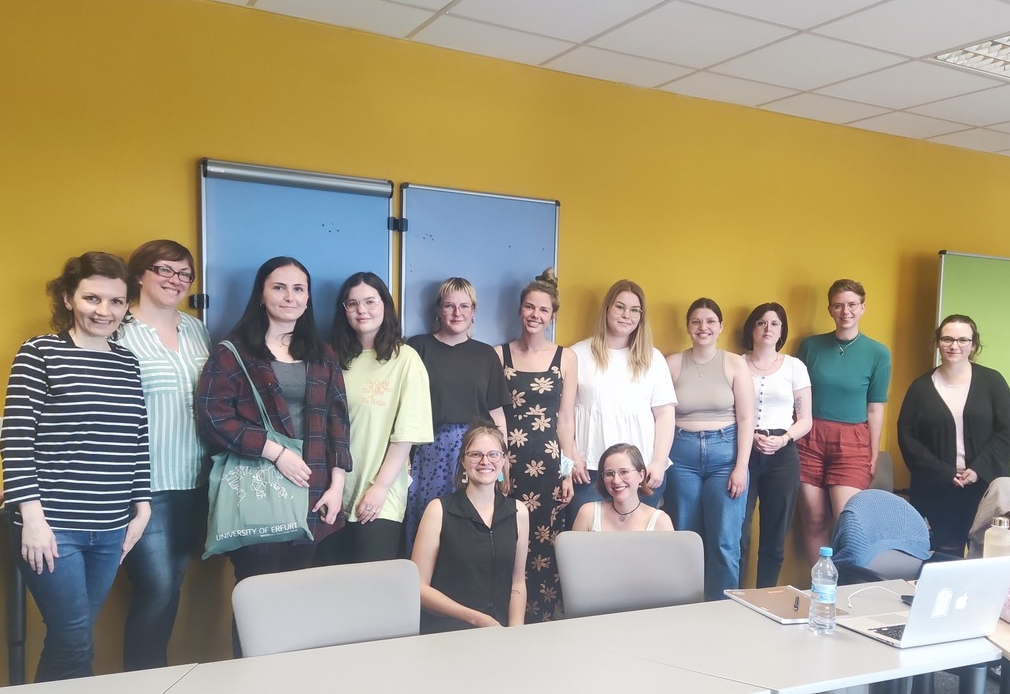International: Review and Outlook - Summer Semester 2022
The European Studies Chair looks back on an eventful summer semester. On the one hand, students were welcomed back to regular face-to-face classes on campus. On the other hand, the EUS program again benefited from international exchange this semester. In the following you will find an overview of the events in the area of international affairs that distinguished the summer semester.
Semester abroad
In the past months, the European Studies students of the 4th semester (BA) were in the middle of the preparations for their upcoming mandatory semester abroad. The 2nd semester students have also started to think about their semester abroad, which will be in the winter semester 2023/24 or summer semester 2024. Dr. phil. Tatjana Samostyan, together with the International Office of Otto von Guericke University Magdeburg, offered an information event on this topic. As part of an Erasmus+ mobility cooperation visit, Dr. Oana Poiană presented the Faculty of European Studies at Babeș-Bolyai University in Cluj-Napoca, Romania, during the information event. Dr. Oana Poiană is a research associate at the Institute of International Relations and Area Studies there.
In the coming semester, many of the European Studies students will spread across Europe to spend their semester abroad on Erasmus+ or Promos scholarships: from Porto (Portugal), Málaga, Murcia and Madrid (Spain), Nice, Poitiers, Grenoble and Paris (France) as well as Fisciano and Modena (Italy) to Sofia (Bulgaria) and Cluj-Napoca (Romania) to Prague and Brno (Czech Republic), Krakow (Poland) and Karlstad (Sweden).
We wish the students a good journey and much success for their semester abroad!
Partnerships, Cooperation Talks, Grants
This semester, the European Studies Chair continues to work on the contract extensions of the cooperations within the Erasmus+ program, so that our students can continue to benefit from the partnerships. Furthermore, Prof. Dr. Eva Heidbreder and Dr. phil. Tatjana Samostyan held cooperation talks about a new partnership with Prof. Dr. Andrew Glencross from ESPOL, European School of Political and Social Sciences, in Lille, France. Glencross is Professor of Political Science and Associate Director of International Affairs at ESPOL.
We are pleased to announce that our applications for Eastern Partnerships (DAAD) and Erasmus+ have been approved. With these grants we can support the mobility of our students, scholars and scientists as well as foreign partnerships.
This semester, the OvGU hosted students from Ukraine from the National University of "Kyiv-Mohyla Academy" (NaUKMA). Their scholarships were funded by the EUS Chair through the Erasmus+ Partner Countries Contract (Ukraine). This enabled them to study away from the war and in safety.
Guest Lectures on Eastern Europe / Erasmus+ Partner Country (Ukraine)
In May, a series of guest lectures on "Current Developments in Ukraine and Eastern Europe" was held by Associate Prof. Dr. Tetiana Kostiuchenko of NaUKMA, National University of "Kyiv-Mohyla Academy". In this course the students could participate in eight exciting interactive lectures.
Here you find the lecture topics of the series "Current Developments in Ukraine and Eastern Europe".
Assoc. Prof. Dr. Kostiuchenko provided the students with broad insights, which could be worked on in greater depth in group work and subsequent discussion sessions. At this point, we would like to thank Tetiana Kostiuchenko once again for the comprehensive series of lectures. Kostiuchenko was accompanied by her colleague Assoc. Prof. Dr. Tamara Martsenyuk, who will offer guest lectures on gender theories, participatory & visual culture, feminism and masculinity in public protests as well as politics and war in Ukraine in the coming winter semester in line with the local internationalization at home strategy.
will.

Description: Tetiana Kostiuchenko (2nd from left) and colleague Tamara Martsenyuk (1st from left) with seminar group.
Another unique opportunity was provided by an online guest lecture on "Russian Society at War" by a Russian scientist, who gave the European Studies students insights into the current reality in Russia. The name of the scientist must not be mentioned here because it is too dangerous for him due to his critical attitude towards the recent events. What views the Russian population has towards Putin and the war and what the situation there is like is difficult to grasp in this country. The scholar described the opposing views and the current tension among the Russian population as a "cold civil war." It is the greatest division since the fall of communism, he said. Furthermore, he observed two coping strategies in society: on the one hand, ignorance, by continuing to live in an "apparent normality" as before, and on the other hand, the search for positive images of the future for one's own reassurance. The second, however, can only be provided by state propaganda - so, says the scientist, many desperately hope that the propaganda is true. It is not possible to make forecasts, but he believes that the discontent in society will grow in perspective and may lead to outbreaks in the long term. Once again, our heartfelt thanks go to the speaker for his willingness to give a first-hand account of the current situation in Russian society.